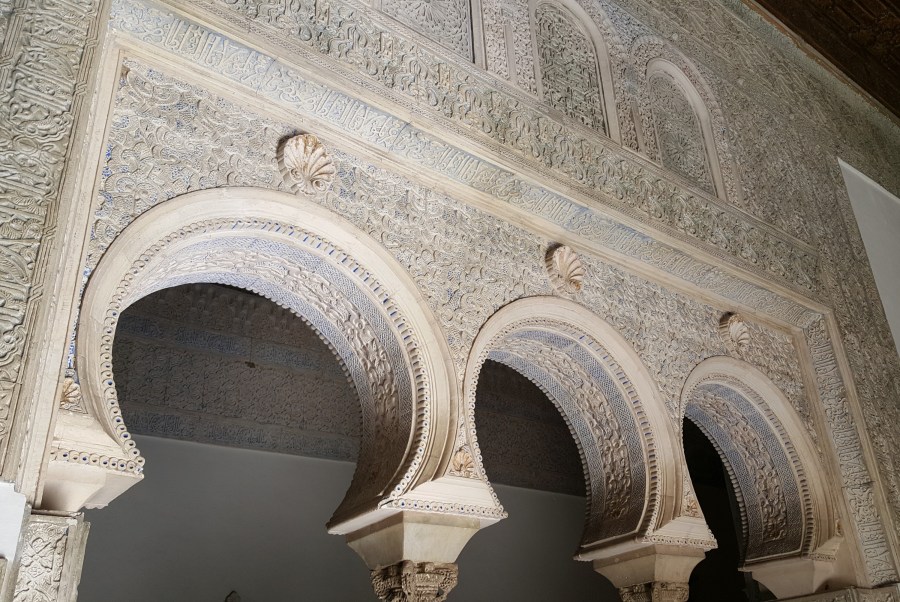Al-Andalus is the forgotten heritage of the Muslim presence on the Iberian Peninsula. A thriving educational center where the Muslims, Jews and Christians were able to coexist in relative peace for almost 800 years. It is a period of European history that is rarely mentioned and if it is then only briefly. Yet it left a legacy that reverberates in those lands to this day. Why are we trying to forget it with such force? What could we learn from that period?
As always with Polish books let me start with the rough translation of the title: Layla Means Night. Aleksandra Lipczak takes us on a journey through modern Spain, looking for the traces of Al-Andalus and examining modern reactions to this heritage.
In her book, Lipczak combines historical information about Al-Andalus and Muslim presence on the peninsula with observations about modern Spain and interviews with people concerned with preserving this part of the country’s history. She also blends in some of the writings and poetry from that time.
It’s a book that made me realize this period of Spanish history has maybe taken 5 minutes in my history classes at school. Let me specify a bit more what time are we talking about here: 711 to 1492. It’s not short by any means. And while Al-Andalus first grew and then gradually shrank, within those 800 years Muslims, Jews and Christians were able to forge a coexistence that created layers of culture that is still visible in Spain and Portugal. But as much as it is visible it also causes vehement denial in some circles.
Lipczak starts with things that did not exist in Spain before 711 and the list is so interesting that I will share it here: rice, oranges, lemons, sugar, pepper, garlic, aubergine, chickpeas, lentils, peaches, apricots, figs, quince, pomegranate, dried fruit, saffron, coriander, marzipan, arroz con leche, artichokes, pumpkins, carrots, cucumbers, onions, spinach, cannellini beans, basil, thyme, sesame, cumin, melons, watermelons, one-pot dishes and hearty soups, spicy sauces, churros, dulce de leche.
Many of those things we now perceive as quintessentially Spanish. And they are, and so is the Muslim heritage in Spain, no matter how vehemently some want to deny it. Apparently, 8% of Spanish words have their roots in Arabic. Starting with frequently used Ojalá, hopefully, coming from ‘ma sha allah’ meaning should God will it.
Lipczak visits Cordoba, Toledo, Sevilla and Granada, speaking to people who try to preserve and revive the Muslim past and to those who would rather forget it ever happened. She explains how Franco on one hand claimed Spain to be Christian to the core, but on the other hand how he’d happily use Morrocan soldiers in the Civil War. She speaks about the laws passed by Ferdinand and Isabela, going back on their word and banishing first Jews and then Muslim from the land.
We also get to know how the coexistence of the three religions fostered cultural exchange, making translations of the Quran and Bible into Latin and Arabic respectively possible. How much of the ancient knowledge about medicine and mathematics was preserved here, and how it progressed in this culturally diverse environment. Cordoba was what New York and London are now, the cultural capital of the world.
Yet Lipczak is not idealizing, she acknowledges that the coexistence wasn’t always peaceful, and definitely wasn’t based on equality as we perceive it now. Nonetheless, everyone was able to practice their religion and was not forced to abandon their home because of it.
Just as this past is messy and often convoluted, so is the book. It does not follow a linear chronology, rather meanders back and forth, in line with the author’s travels. It is brutal when describing the current situation and then quickly turns dreamy, as Lipczak focuses on poetry or art.
As much as the book was not even for it brought into focus something that I was only vaguely aware of. And I think it does pose an important question for the future. Is the idea of Spanish Spain an illusion useful to politicians? What do nation-states even mean in today’s world? Is there another way that may be inspired by the past? A way to a more open world in which we can coexist rather than close the borders to immigrants and foster our sense of besieged fortress and paranoia.

Oh, what a shame, I am fascinated by this period, as I have distant Spanish ancestry, but me and my cousins still look SO Spanish and I get mistaken for a person of Arabic heritage in North Africa, so I’m pretty sure we have North African Muslim forebears (I’m not a woo kind of person but I feel so at home in some places in Tunisia, for example, too). So I hope this has been translated into English!
LikeLiked by 1 person
Ha! Unfortunately not yet, but I hope one day it will be 🙂 that period in the history of the region is fascinating and definitely not known or appreciated enough
LikeLike
Pingback: 20 Books of Summer 2021 – Belated Summary – #20BooksofSummer21 – bookskeptic.com
Pingback: Q3 2021 round-up – bookskeptic.com
Sounds wonderful! Have you read The Moor’s Last Stand by Elizabeth Drayson? Highly recommended also. keithbradburyauthor.com
LikeLiked by 1 person
Pingback: Ludzie z Placu Słońca – Aleksandra Lipczak – bookskeptic.com